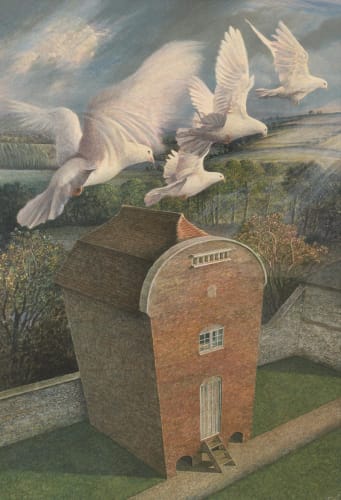Over the last thirty years James Lynch has gained a reputation as one of the country’s leading landscape and animal painters. His egg tempera paintings of rural England, and his depictions of dramatic weather and seasonal light are reminiscent of the English Romantics.
Over the last thirty years James Lynch has gained a reputation as one of the country’s leading landscape and animal painters. His egg tempera paintings of rural England, and his depictions of dramatic weather and seasonal light are reminiscent of the English Romantics.
‘He is very much a part of the archetypal English landscape, and the mythology which has grown up there. He belongs to a long line of truly English painters—Constable, Stubbs, Palmer, Ravilious—who do not need to venture abroad for their inspiration but are secure in their own surroundings’ (Anne Heseltine, 2011).
Yet at the same time ‘[…] the paintings they carry a deeper message, from within the dark earth, a message of continuity across generations, attached to the land’ (Rupert Maas, 2006).
In the Renaissance tradition, James Lynch makes his own egg tempera paint, combining raw pigment with egg yolks. The translucency of the egg tempera allows the bright gesso ground to reflect ambient light through the pigments, and gives the paintings an otherworldly luminosity. Herein perhaps lies the most remarkable character of his artistry: that he turns traditional materiality so skilfully towards a new-world perspective. In 2017 he noted, ‘perhaps my paintings have always been about ‘parrallel realities’—the conjunction of the seen and the unseen, the interplay of natural forces and man’s intervention in the landscape’.
James Lynch (b.1956) grew up in Wiltshire and now lives and works in Somerset. His work is included in the National Trust collections at Kingston Lacy, Wimpole Hall, and Chartwell. Awards include; the Elizabeth Greenshields bursary (83’), the Royal Academy Award for watercolour (86’) and the Spectator Art Award (93’).
In June 2017 a major new commission, Looking South from Stoke Camp, was unveiled at the re-opening of the Somerset Rural Life Museum, Glastonbury.

